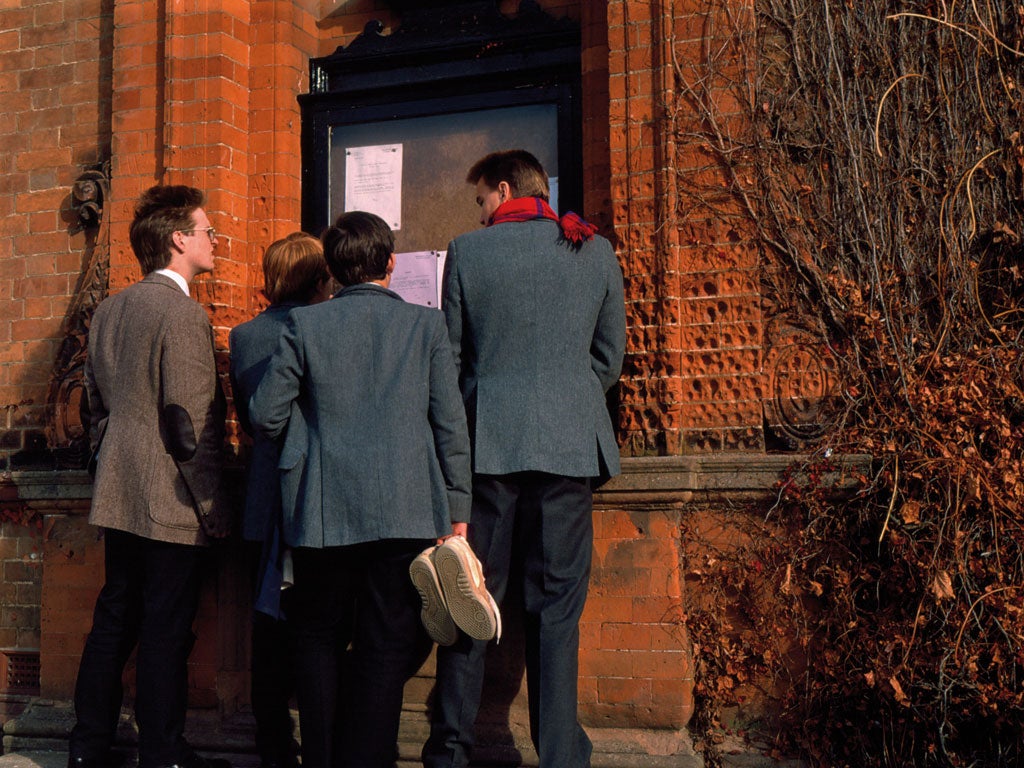What’s the difference between a private school education and a state one? The size of your ego
“Soft skills”, as it turns out, really aren’t as soft as they sound


Your support helps us to tell the story
From reproductive rights to climate change to Big Tech, The Independent is on the ground when the story is developing. Whether it's investigating the financials of Elon Musk's pro-Trump PAC or producing our latest documentary, 'The A Word', which shines a light on the American women fighting for reproductive rights, we know how important it is to parse out the facts from the messaging.
At such a critical moment in US history, we need reporters on the ground. Your donation allows us to keep sending journalists to speak to both sides of the story.
The Independent is trusted by Americans across the entire political spectrum. And unlike many other quality news outlets, we choose not to lock Americans out of our reporting and analysis with paywalls. We believe quality journalism should be available to everyone, paid for by those who can afford it.
Your support makes all the difference.State school applicants from run-of-the-mill comprehensives apparently report feeling out of place when they attend elite universities. I never did, but this may be because my halls of residence looked like the badly constructed theatre set of a post-apocalyptic dystopian play: mysterious handprints on the walls, urine-soaked sinks in every cell-like bedroom, and hordes of dead-eyed people wandering the hallways and occasionally weeping.
In this ugly and soulless place, where I once memorably woke at 4am to find a member of the local homeless population merrily preparing the frozen pizza I’d bought for myself the day before, there were no intimidating baroque archways or ancient portraits of students past.
The library was grand, but I was comfortable in the knowledge that I could always return to my rickety iron bed (was that a bedbug or just regular old peeling paint from the ceiling?) and feel like I was queen of my own dirt heap, rather than an imposter stumbling into someone else’s lair.
But let’s hold a moment’s silence now for those who are not so fortunate. Dogged by feelings of inadequacy, cast adrift in an environment replete with architectural splendour, shouted down in seminars by the Etonite who was head of his school’s debating society, these students tend to do what they were always taught to do at school: keep their heads down.
Because in a comprehensive, clever kids learn quickly not to draw attention to themselves. Thrust them into an environment where the gilded halls echo with the self-confident, RP-inflected voices of their privately-educated peers (who make up almost 50 per cent of the intake in many elite institutions, despite private schools educating only 7 per cent of the student population) and they won’t exactly end up bleeding assertiveness.
That’s why the latest statistics on state versus private school achievement in the workplace don’t surprise me one bit. Even after they’ve graduated from good universities and entered into high-paying jobs, students from fee-paying schools continue to feel the benefit of their early education. They earn more, and their salaries rise more quickly, according to the Sutton Trust.
One plausible explanation is the lasting benefit of “soft skills” drummed into private pupils from their first day. Those rousing assemblies about conquering the world; the extracurricular activities that eke the talent and enthusiasm out of even the most unresponsive little brat; that self-assurance that comes from having one’s youthful opinion seriously contemplated by an authority figure. They all leave impressions longer lasting than any of us had imagined.
My own state education was disappointingly mundane. It wouldn’t exactly make for an Oscar-winning screenplay about one woman battling adversity against the odds, but it was certainly uninspiring. The teaching was almost pathologically boring, the extracurricular activities non-existent, and nobody once robustly patted me on the shoulder and loudly described me as a “leader of tomorrow”.
Do I resent this lack of ego-stroking? Of course! Oh, for the chance to have been molly-coddled and cosseted, to have been taken on school trips skiing in the South of France rather than cataloguing the canned section of the local supermarket for Harvest Festival. Somehow, though, I managed to develop a protective shield of narcissistic self-obsession, or god knows what would have become of me.
Because “soft skills”, as it turns out, really aren’t as soft as they sound. They’re the difference between recognition and invisibility, salary hikes and underpayment, promotions and years spent languishing in the same role at work.
Perhaps we need to replace general studies or citizenship with some genuinely useful social lessons in our comprehensives: debating competitions, inspiring speakers, non-fatalistic career advice. Our state-educated pupils deserve an insufferably British sense of personal entitlement as much as their richer counterparts. Let’s stop ignoring the obvious solution to an ever-widening confidence gap.
Join our commenting forum
Join thought-provoking conversations, follow other Independent readers and see their replies
Comments